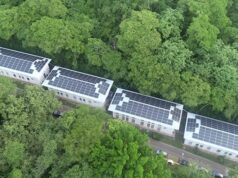
RALEIGH, N.C.—In October, the Raleigh Convention Center joined an elite group of convention centers—those that have earned Leadership in Energy and Environmental Design (LEED) certification from the U.S. Green Building Council. In Raleigh’s case, it earned LEED Silver, joining the Phoenix Convention Center, Spokane (Wash.) Convention Center Expansion, and the Oregon Convention Center in Portland, Ore., as LEED Silver recipients. The Raleigh facility earned the LEED designation a little more than a year after the center opened in September 2008. The Raleigh Convention Center is owned and managed by the City of Raleigh. According to Laurie Okun, director of sales and marketing for the center, it made financial sense to pursue LEED certification.
“The costs were neutral,” Okun says. “It was going to cost just as much one way or another.”
The convention center was built on an 11-acre site located on the southern edge of the downtown business district. The site previously included a car dealership and associated buildings. An advantage to using the urban site was being able to utilize existing infrastructure—water, sewer, roads, and adjacent parking. Construction on the center was delayed by a year when an old coal gasification plant from the late 1800s and early 1900s was discovered on the site.
Construction Debris Recycled
During construction, a total of 9,512 tons of debris—including more than 350 tons of steel—was collected and recycled back into the manufacturing stream for new steel products and other items. This number equates to 88 percent of the total waste generated during the project. In the new structure, recycled materials account for 37 percent of all construction content. All of the tan colored brick in the building was mined and manufactured about 200 miles away near Charlotte.
The convention center is a highly efficient building. Thanks to low-flow toilets and urinals, the center is expected to save more than 825,000 gallons of water per year. The planter beds in the front plaza area and the tree pits along the sides of the building utilize a highly efficient drip irrigation system. Additionally, a rainwater harvesting system is employed which collects rainwater from the roof and stores it in a large tank located in the loading dock area. A small pump then recharges the irrigation lines to complete the irrigation system which uses no water from municipal sources.

Lighting systems are connected to the building automation system and will turn on and off as people enter or vacate meeting rooms. Street lights include LED lamps to save energy. A recycling program ensures that glass, metal, paper, cardboard and plastic are recycled. Low-emitting paint products and low-emitting carpet systems ensure that the quality of indoor air is excellent. Smoking is not permitted inside the center.
Reflective Roof Makes Difference
A single ply rubber membrane roof was installed. The white color of the roof is highly reflective and is able to shed massive heat gain from the roof area, thereby reducing the cooling demand from the air-conditioning equipment.
Housekeeping staff use environmentally safe cleaning products and supplies to maintain the facility. Training has been provided to the staff to ensure proper mixing and application of all cleaning chemicals and equipment.
Bicycle racks have been installed close to the employee entrance for those workers who choose to ride their bikes to work. To encourage more bike riders, male and female showers and changing rooms have been provided to employees to freshen up before starting work.
From a marketing/adding new business standpoint, Okun says building to LEED standards has generated some “early successes.” What has been most promising has been the number of partnerships the center has been able to build because of the commitment to sustainability—partnerships with organizations such as North Carolina State University and Cree, Inc., for example.
Click here for more information.
Glenn Hasek can be reached at editor@greenlodgingnews.com.






